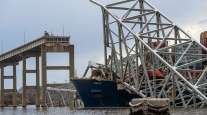Funded Miami Interstate Project Makes Trump’s Infrastructure List
A preliminary list of 50 public construction projects that the Trump administration is considering including in a promised initiative to renew the country’s deteriorating infrastructure has just one Florida project on it, but that job — the rebuilding of Interstate 395 in downtown Miami — is already budgeted and moving rapidly forward.
The Florida Department of Transportation is close to awarding a design-build contract for the $800 million project, which has been in the works for years and is scheduled to begin construction by the end of this year. At least a portion of the project is funded, but the full financial picture could not be determined Jan. 25 because FDOT officials in Miami said they didn’t have the information.
The complex and controversial project encompasses the total replacement of the functionally obsolete, 1.4-mile-long elevated span that connects Interstate 95 to the MacArthur Causeway, including the much-maligned low overpass over Biscayne Boulevard, which would be replaced by a soaring “signature” bridge.
RELATED: To toll or not to toll is question for Trump infrastructure plan
It also includes the piece of I-95 that connects 395 to State Road 836 as well as a reconstruction of 836 from I-95 to Northwest 17th Avenue. The $186 million SR 836 portion is being funded in full by the Miami-Dade expressway authority out of toll revenue and requires no federal money, though FDOT will be managing construction, said MDX spokesman Mario Diaz.
FDOT is now evaluating bids from six shortlisted finalists for the contract and expects to select a winner shortly. The project is billed as a private-public partnership, or P3 in industry lingo, in which the contractor typically provides some up-front financing and is later paid back by the government. FDOT projects are funded mostly by the Federal Highway Administration.
It’s unclear how the I-395 project wound up on the infrastructure list, which was provided to the National Governors’ Association by the Trump transition team. Miami Herald parent McClatchy’s Kansas City Star and New Tribune newspapers obtained a copy of the list. The Star also obtained another, more detailed document with an almost identical list of projects, circulated within the congressional and business communities, that also includes the I-395 project.
RELATED: Infrastructure pushed during NGA leaders’ state of the states address
Tish Burgher, spokeswoman for FDOT’s District Six, which includes Miami-Dade County, said the agency was unaware the project was on the list until officials read a McClatchy story on it on Jan. 25.
Frank Schnidman, a recently retired Florida Atlantic University urban planning professor who is well connected in state governmental circles, said the presidential transition team had asked the administration of Florida Gov. Rick Scott for “shovel-ready” projects to consider as part of the infrastructure initiative, a key Tump campaign promise.
A spokesperson for the governor’s office issued a terse e-mail response to a Herald query, saying, “This is not accurate. Please contact the creator of this list for information on how it was chosen,” but failed to elaborate.
Though FDOT would likely have already budgeted for a major project like the I-395 reconstruction before proceeding to contract procurement, Schnidman said, the agency could be awaiting final approval from the highway administration or be seeking to fill funding gaps.
That would allow Trump to claim credit for resulting jobs and infrastructure improvements even if the project likely would have moved forward regardless of the White House’s occupant, Schnidman noted.
RELATED: States send Trump wish lists for promised infrastructure plan
“That’s politicians,” Schnidman said. “The president obviously wants jobs, and this thing has been in the works for a long time, so it’s shovel-ready and it can provide jobs right away. This is a slam-dunk for Trump.”
The more-detailed of the two Trump project lists contains only a brief overview of the I-395 plan. It lists the cost at $800 million — though only a portion of that would be covered by the federal government — and says it will generate 800 jobs. It also includes with it a photo of a different, rural highway.
FDOT has been planning to replace I-395 for at least a decade, saying it’s not only past its life span but is unsafe because its layout forces motorists to weave across lanes to reach exits. The agency has already spent millions purchasing land along the north and south flanks of the existing roadway, which will be replaced in phases over five years.
Some elected officials, including former Miami Mayor Manny Diaz and Miami-Dade Commissioner Xavier Suarez, have fruitlessly pressed for the agency to bury the highway, which is widely seen as having contributed to the deterioration of mostly black Overtown by splitting it asunder when the roadway was built in the 1960s.
Instead, in a compromise, FDOT developed a conceptual plan that calls for further elevating the roadway and reconnecting closed surface streets by eliminating the massive earthern berms that support portions of the highway.
The plan also calls for a dramatic arching bridge over Biscayne Boulevard, now physically obscured by a low and gloomy overhead span, to make walking along it far more alluring, but some critics have complained of the added cost. When FDOT officials considered cutting the signature bridge out to save money, though, the city of Miami sued, and the agency restored the feature to settle the case.
FDOT’s blueprint also envisions turning acres of land under the new, super-elevated highway into public parks, though that’s not covered by the $800 million budget.
The contractor selected by FDOT for the job would be responsible for designing the new roadway and signature bridge as well as building it.




